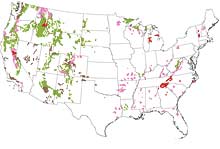If you love forests, give them some space
The glossy photos and poetic phrases used to market Western North Carolina’s mountain real estate are cropping up everywhere. Printed on billboards, broadcast via commercial Web sites and tucked into display ads in fashionable magazines, the sales pitches are meant to evoke the beauty of the landscape: “Inspiring mountain views.” “Sweeping highlands.” “Mountain resort living.” “The serenity of true high-country living … set in the pristine forests of the Blue Ridge Mountains.”

Some of the most desirable real estate is squeezed up against national-forest boundaries, where the publicly owned land can be counted as a private amenity. A report released by the U.S. Forest Service on Oct. 25 notes that residential development along forest edges is on the rise in Western North Carolina and predicts an upward trend for years to come. The nationwide study, titled National Forests on the Edge, pinpoints areas most likely be impacted by future development and details the adverse effects. Western North Carolina’s national forests are ranked as the fifth-most-impacted area nationwide, with a projected 30-percent growth in housing density on adjacent lands by 2030. Many of the highest-ranking areas highlighted by the report are in the Southeast.
“These are attractive places to live,” observes Ralph Alig, a Forest Service team leader based in Corvallis, Ore., who helped write the report. Part of the challenge, he says, is the nation’s projected population growth: As more people relocate to pristine lands to get away from crowded cities, the natural environment is compromised. The U.S. population is projected to increase by about 120 million by 2050, according to the Census Bureau Web site.
For residents who love the outdoors, living beside a national forest can offer unparalleled recreational opportunities. But even the most environmentally conscious homeowners may unintentionally degrade the very forests they love, the report concludes, simply by opting to live beside them. Development side effects such as noise, lights and roads can adversely affect wildlife, the study notes. And threatened or endangered species may be more imperiled once their habitat is fragmented. Of particular concern are the effects of sediment and storm-water runoff on water quality. As the report emphasizes, “America’s national forests and grasslands provide the largest single source of fresh water in the United States.”
For Valerie True, coalition coordinator for the Blue Ridge Forever land-conservation campaign, the report contained few surprises. Rapid development near pristine lands is a primary concern of local land trusts—and a catalyst for the current push to protect 50,000 acres in WNC, she notes. “We need to be protecting this land before it’s too late.”
You can bet your beans on it
Gazing into a future of ever-scarcer petroleum, Cathy Holt of Sustainable Asheville believes that the time to develop sustainable food-production systems is now. “Everything from nitrogen-based fertilizer to the transportation of food is heavily dependent on fossil fuels,” she says, adding that a typical food item in a conventional grocery store has traveled 1,200 to 1,500 miles before it’s purchased.
To that end, Holt is organizing a panel discussion about local food that will tackle big questions, such as how Asheville can increase its food security in preparation for a time of petroleum scarcity. With a focus on community gardens, the event will also provide practical information about growing organic food.
Speakers will include Linda Blue, of the North Carolina Cooperative Extension; Stewart David, representing Asheville Vegetarians; Linda Lengnick of Warren Wilson College’s Agriculture Program; Kate Slattery, outreach director for the Appalachian Sustainable Agriculture Project; Turtle, a volunteer with the Bountiful Cities Program; and Robert White, founder of the Pisgah View Apartments Community Peace Garden.
The panel will be held Thursday, Nov. 8, at 7 p.m. in the Unitarian Universalist Church of Asheville, 1 Edwin Place. The event is free, but donations will be accepted.



Before you comment
The comments section is here to provide a platform for civil dialogue on the issues we face together as a local community. Xpress is committed to offering this platform for all voices, but when the tone of the discussion gets nasty or strays off topic, we believe many people choose not to participate. Xpress editors are determined to moderate comments to ensure a constructive interchange is maintained. All comments judged not to be in keeping with the spirit of civil discourse will be removed and repeat violators will be banned. See here for our terms of service. Thank you for being part of this effort to promote respectful discussion.